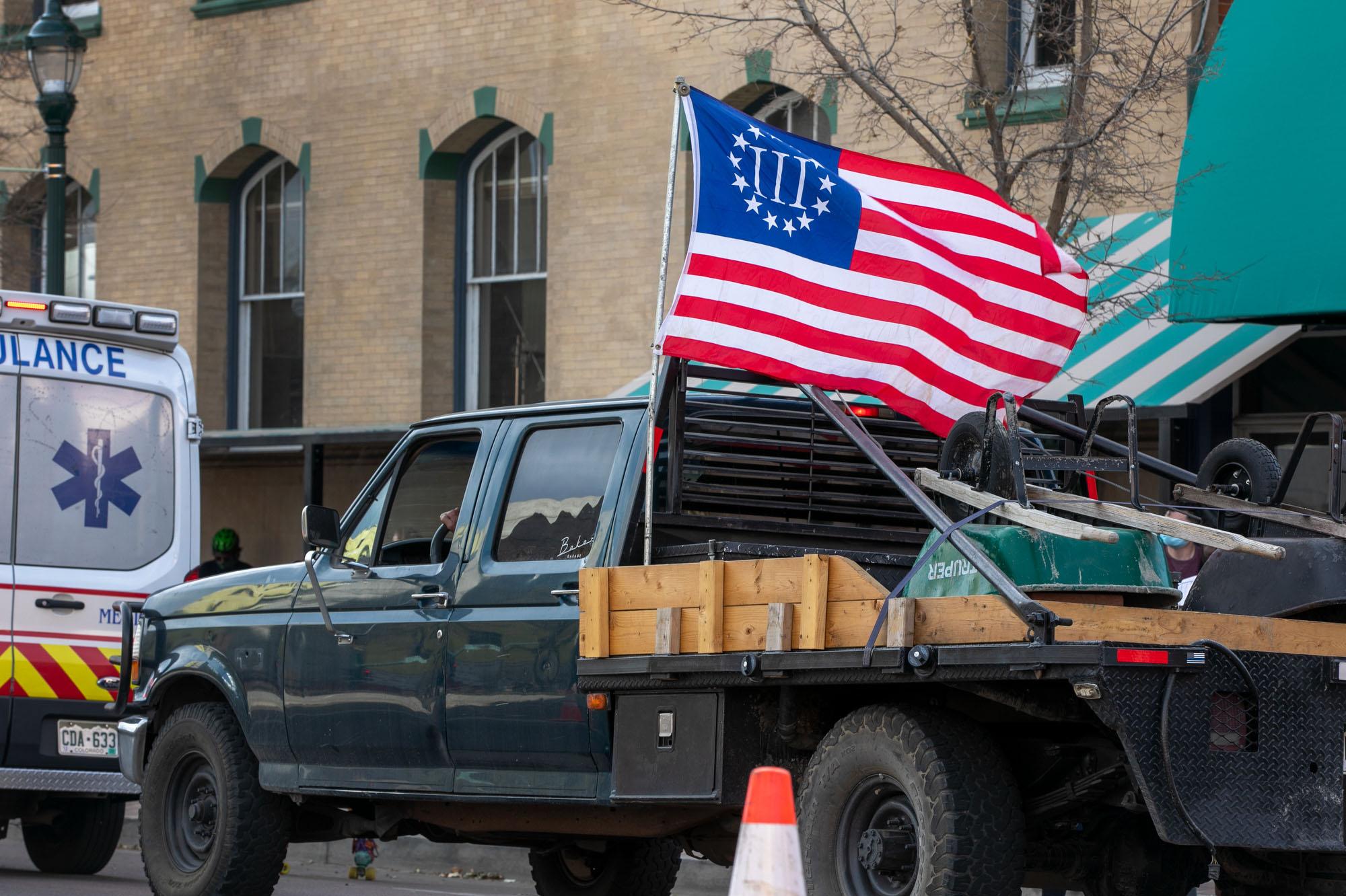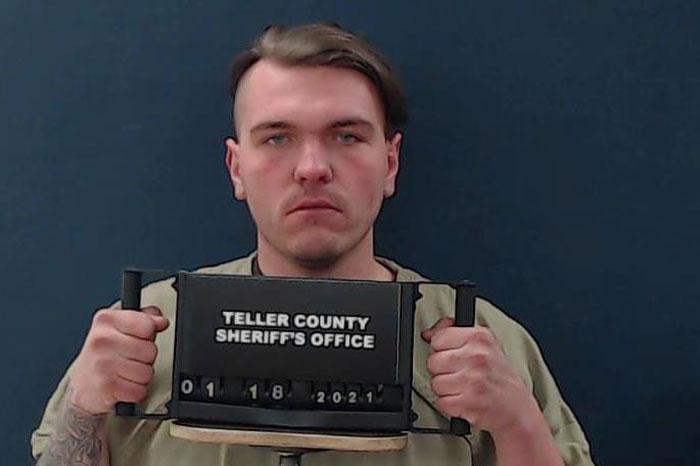
Many of the hundreds of suspects charged with storming the U.S. Capitol came from small towns across America where they made no effort to hide even extreme political views.
But in many cases, even in rural areas where the local police and deputies might have the best chance of spotting extremists, law enforcement was unaware of the militia members and others operating in plain sight.
This includes people like Robert Gieswein.
The Woodland Park resident with no criminal history was wearing paramilitary gear on Jan. 6 when he allegedly stormed the U.S. Capitol carrying bear spray and a baseball bat. Gieswein, according to the FBI, was a member of the Three Percenters, a group federal prosecutors have dubbed “dangerous and violent.” Investigators believe they are loosely affiliated with the Oath Keepers, a paramilitary group that officials have said in documents was “plotting to undo” the election results.
But Gieswein’s Three Percenters was not a group Teller County Sheriff Jason Mikesell knew well.
“I don’t know a whole lot about them to tell you the truth. Other than they show up and they do some different events for the U.S. flags … That doesn’t mean they’re doing anything wrong in being part of a group,” Mikesell said. “A lot of normal people are being labeled as extremists.”
Federal authorities rely on local police and sheriffs to be the foot soldiers in efforts to root out domestic extremists in communities across the country — but how much local officials actually track extremist groups varies from place to place.
Police chiefs and elected sheriffs across Colorado say they work with federal law enforcement on intelligence sharing to help understand the current threats. But given that specific investigations are still often decided by local leaders, it’s up to them to decide whether to track a group or contact someone making online threats.
Plus, the feds often caution local authorities to not cross free speech boundaries, which means local deputies must carefully balance respect for First Amendment rights against the need to anticipate possible violence.
“We have to make sure we adhere to the specific regulations on this: People can belong to a group, it’s the individual actions or the group actions” that may cross the line, said Denver Police Chief Paul Pazen. “We are aware this is a significant issue. This isn’t a D.C. thing. This is real and here.”
Taking an individual approach
That tension creates challenges for law enforcement officers scattered across Colorado, where there are blossoming extremist groups and people who may have been radicalized and pose a danger. Four Coloradans have so far been charged with federal crimes connected to the storming of the U.S. Capitol on Jan. 6.
In Mesa County, Undersheriff Todd Rowell is taking a notably personal approach in monitoring extremist activity. He called it fairly “uncomplicated.”
Though his jurisdiction covers roughly 160,000 people, he said that Grand Junction is still a small town for the most part. He would be “shocked” if someone among his approximately 250 employees weren’t already aware of any person of interest in a potential domestic extremism investigation.
“A lot of the time, we have relationships already built with those people,” Rowell said. “We know the people who live on those fringes in our community … You’re talking the 1 percent of people who are on the fringes, who pose a risk to the community. We know who those people are.”
When someone hits his radar as potentially dangerous, he or one of his deputies usually makes a phone call, or sometimes even requests an in-person meeting to check on them.
The priority is to follow up on every report they get.
“Very early on, we try and contact this individual and sit down with them… to see if it is someone who is just making statements in a polarized environment or are they taking substantial steps to commit criminal activity,” Rowell said. “Just like we would on a gang committing crimes in our area.”
Mesa County’s undersheriff isn’t alone in equating militia activists with gang members.
During one of Gieswein’s hearings in January, a federal magistrate drew the same comparison as he weighed the evidence of Gieswein’s participation in the Three Percenters.
“Until this case, I knew nothing about this group,” Magistrate Judge Scott Varholak said. “But if you replace ‘Three Percenters’ with any well-known gang, I would think multiple photos … flashing signs … while posing in front of a gang flag with others wearing clothing with that gang on it would be sufficient to say he is in that gang.”
Balancing public safety and the First Amendment
Since Jan. 6, much of the FBI’s attention has shifted to investigating participants in the U.S. Capitol break-in — with more than 200 arrests so far — making this perhaps the largest domestic terrorism investigation ever.
Though federal officials always point out that it is not illegal to belong to groups like the Three Percenters or the Oath Keepers, lengthy descriptions of those groups are embedded in many of the criminal complaints against their members.
“Gieswein has posted multiple pictures on his Facebook profile in which Gieswein flashes hand signs commonly used by the Three Percenters, while posing in front of a Three Percenters flag with others wearing clothing bearing Three Percenters logo,” Gieswein’s complaint said. “In addition, I believe based on social media postings that Geiswein runs a private paramilitary training group called the Woodland Wild Dogs.”

Gieswein is still in federal custody.
After Jan. 6, the FBI said in a statement that it understands the importance of developing and maintaining strong relationships with local law enforcement agencies.
“By proactively engaging with our partners, we gain a better understanding of their perspectives on potential threats and concerns and are able to enlist their support in deterring threats to the community,” said Courtney Bernal, a Denver FBI spokeswoman.
The FBI opened more than 400 domestic terrorism investigations over late spring and summer of 2020 — that included both cases into left-wing antifa adherents and right-wing extremist groups, according to a New York Times report. Bernal declined to verify the numbers or talk about any local investigations. The Southern Poverty Law Center has identified 17 organizations operating in Colorado that meet its definition of a “hate group.”
Douglas County Sheriff Tony Spurlock often looks back to 9/11 when thinking about domestic extremism and how to prevent it.
“How many people really knew about these individuals taking flight lessons at a local level?” he said. “People scratching their heads and saying, ‘this isn’t right.’”
Spurlock acknowledged it can be more difficult for his intelligence deputies to root out problematic crime-plotters embedded in legally allowed paramilitary groups than, say, a known criminal gang like MS-13.
“I find it really hard to find anything legitimate that MS-13 does. They are a criminal organization,” Spurlock said. “You can get political organization groups and sometimes their motives start out politically driven and then it turns into some kind of criminal act … and it is difficult to make the distinction.”
He said participants could be “aggressive noisemakers” legitimately “asserting their First Amendment rights” or they could be hiding behind the First Amendment to plan political violence.
“The danger with noisemakers is they stir up other people to do stuff. It’s a delicate balance,” Spurlock said. “I think that’s difficult for cops every single day.”
For his part, Teller Sheriff Mikesell said he couldn’t say much about any ongoing probes into extremist groups in his jurisdiction because federal law enforcement is currently investigating Gieswein’s group.
“It’s treated as though it was this huge organization running rampant in the county and what I find interesting is, find someone in this county who even knows who they are,” he said. “You’re going to have lone wolves that do these types of things. Nobody believes what he did was right.”
Mikesell said he is worried, though, that people with critical views of the U.S. government will be tarnished by Gieswein’s actions.
“That’s what is sad to me,” he said. “What I’ve seen during this event is how many other groups, that are just veterans groups or organizations … that will be identified (as extremists). It’s unfortunate.”









